#And acts accordingly. Which just cements the other's belief that what's happening is just a very cruel and mocking rejection
Explore tagged Tumblr posts
Text
Stolitz, and their fear of rejection and sense of worthlessness turning into a self-fulfilled prophecy.
Blitz—
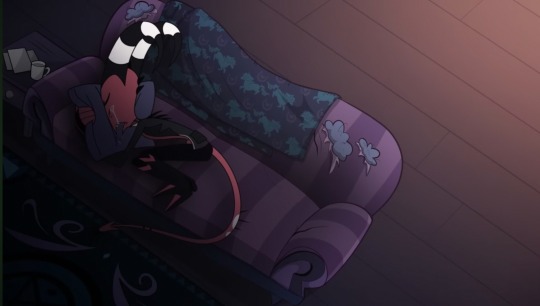
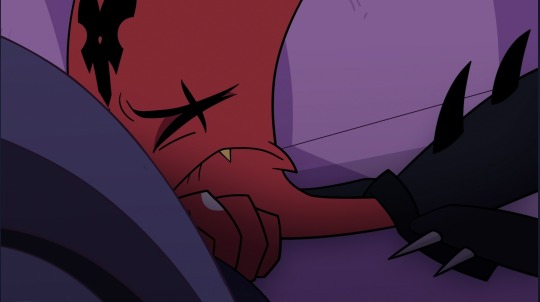
Does anybody love you, Blitzo? / No.
Eventually everyone goes...
Stolas only cares about having a rugged peasant raw-dog him into his mattress. It's nothing... You know. It's nothing else.
I'm going to die alone, aren't I? Just a wrinkly, old, withered waste.
Royal demons don't give a shit about guys like us. They're all the fucking same.
Stolas, don't act like what we have is anything but you wanting me to fuck you. You make that really clear all the time.
But you don't want to do things alone, Blitzo.
I mean, Stolas is just a loud, thirsty bitch who loves feeling the thrill of being dicked by the lower class. It's a novelty to him.
And then he'll call me and try to see how my day was, and he'll pretend to care about me, and comment on my photos, and laugh at my jokes... /Oh well that's definitely your clue right there that it's all bullshit / I know, right?!
It's all my fault. I'd hate me too. I mean, I do hate—
You're going to die alone. You're gonna die alone, Blitzo.
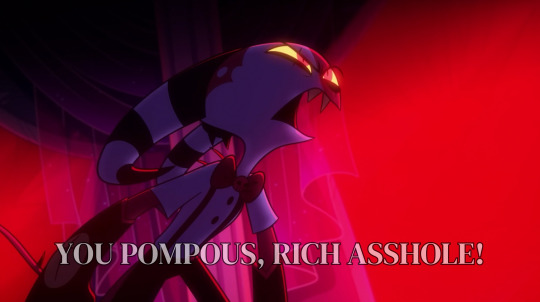
[My worst fear has come true. He couldn't possibly want me. This has to be a joke. He's selfish and an asshole, just like the rest of them. He's trying to get rid of me; that's the only explanation. I'm just a broken toy he's finally gotten bored of, just like I knew would happen. He won't even fight for me, and why would he? I could never be good enough for him. It's happening again. I'm being abandoned by someone I care about. I really am going to die alone.]
Stolas—

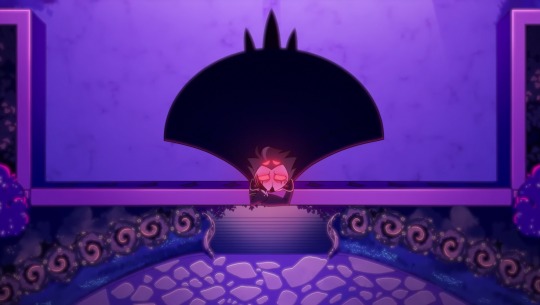
Would he want me if he was free? And if he's only here as a prisoner, what kind of monster does that make me?
I mite b bsuy / I wouldn't want to bother you!
You see... I seem to have found myself with, um. Feelings for him. And I'm not sure if it's a mutual thing.
Dearest, I know better now, I must give you this choice.
I'll save us both before we grow cold.
What's between you and I? Just a comfortable lie.
I'm sorry it's a bad time yet again, Blitzy...
He deserves the choice to stay or go.
So I'll grant you this mercy, this bind on our souls needs to end...
Next time you come over, maybe we can talk about what happened at Ozzie's? / Y? / I'm sorry! Nevermind, it's not a big deal.
What's left for me and my broken heart if I cannot have you? Unless it's me, and no matter what in this world I could give, it's not enough to get through the walls you've conjured up to live...
I'll believe him, and not the voice that says I'm not enough.
I'll fucking die alone if this goes bad!
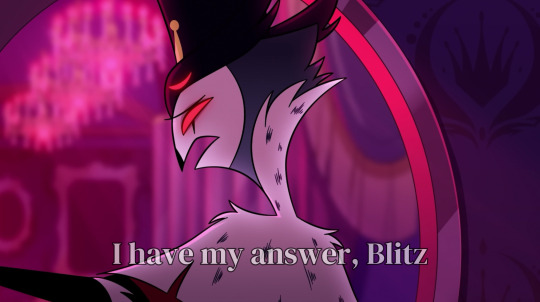
[My worst fear has come true. I truly am not worthy of being loved. He's rejecting me— no, mocking me for even thinking he could ever want to be with me if he didn't need my book. I've been taking advantage of him all this time, all the while believing we had something real and being naive enough to think he could love me back. I am a monster. And now that he can, he has chosen to leave me. So now the least I can do is quietly let him—the only person I have ever wanted and felt alive with—go. I really am going to die alone.]
#helluva boss#helluva boss spoilers#helluva boss the full moon#stolitz#blitz helluva boss#helluva boss blitz#stolas helluva boss#helluva boss stolas#helluva boss full moon#helluva boss meta#More or less?#image description in alt#I am sorry for inflicting pain but I simply cannot suffer alone#They both think they're being rejected when truly they're both desperate to be enough for the other#But as soon as they give the other a chance to say 'I want you too'#(Stolas with his heartfelt confession; Blitz with his 'hold on Stolas' and his 'LET'S GO!')#The other immediately goes 'oh so I was right. He really actually does not want me around. Just like I feared#And acts accordingly. Which just cements the other's belief that what's happening is just a very cruel and mocking rejection#HE'S NOT REJECTING YOU HE'S REACHING OUT SAYING 'WILL YOU LOVE ME ENOUGH TO TELL ME HOW YOU FEEL' YOU IDIOT#<- me at BOTH of them#Their trauma is so well written I am in awe always and forever. Every step of the way. Their brokenness heals me.#It's going to be so cathartic when they grow to understand one another's perspective
259 notes
·
View notes
Text
Listen up, guys, becuase I’m about to hit you with Harry Potter feels.
One of the main character analyses that I’ve seen about Harry is that he doesn’t trust adults, specifically because of his upbringing with the Dursley’s, and a lot of his experiences at Hogwarts have cemented his beliefs that adults are incompetent and/or untrustworthy. And I read these and was like, “sounds legit.” It’s been a while since I’ve read the books, but I remember the events well enough to agree with those analyses.
I’m now rereading the Goblet of Fire, and realizing exactly how accurate they are.
Let’s start with right when the students find out about the tournament. There will be three champions, one from each school. There is an age limit. There is an age line was set by Dumbledore and cannot be tricked. Harry sees this is true when Fred and George’s attempt fails.
But then Harry gets chosen. And all of those rules don’t mean anything, becuase someone was able to get around them, to get around /Dumbledore/, and now Harry has no choice except to compete in this tournament. All of the safeguards were put in place, and they still didn’t protect him. Even worse, he can’t ask any of the adults for help with these dangerous tasks that may kill him. You know, things a fourteen year old should have to deal with.
First task actually goes okay, becuase he gets help from Hagrid, Moody, and his friends, and he has all the information, and he’s putting himself and only himself at risk. That’s fine, Harry can focus on what he has to do. He’s a good flier and he knows it, he can get the egg with what he’s got. Minimal assistance required.
Then we get to the second task. This is where everything goes downhill, trust-wise. First off, Harry is super stressed, which is kind of his own fault, for not starting on the egg earlier, but he has absolutely no idea how he’s going to breathe underwater for an hour. Which is kind of important to figure out, becuase he doesn’t want to die. He falls asleep due to exhaustion, and is woken up ten minutes before the task starts to Dobby telling him that he has to go, his best friend has been taken by merpeople, and hey, here’s something to make you breathe underwater.
I remember seeing a post on tumblr saying that Harry treats every potential treat as if it’s actually happening; he assumes the worst case scenario is true. This is what Harry knows: Rom has been taken by merpeople, and the song in the egg literally says that if he doesn’t save him within the hour, he’ll be gone for good. Harry takes this for the literal truth, which is essential to understanding his actions in the rest of the chapter. To the reader, this might seem irrational. We know that the teachers won’t let anything happen to Ron, so we think Harry’s overreacting.
Harry finds the hostages. It’s not just Ron. It’s Hermione, his friend. It’s Cho, who he likes. It’s Fleur’s sister, who isn’t more than eight years old. He is the only one there. The merpeople won’t help. The adults won’t do anything. The other champions aren’t there. He has no idea when they’re going to show up. The hostages are unconscious and somehow spelled to breathe underwater, but he has absolutely no idea how long that’s going to last. For all he knows, anyone who isn’t saved is going to be left behind to drown.
Cedric shows up, saves Cho. One down. Krum comes and cuts Hermione free. She’s safe. There is no sign of Fleur. No one is going to help him, no one will come to save Fleur’s sister. Harry is the only one there and he doesn’t want her to die, so he scares the merpeople off and grabs them both.
Afterwards, Ron scolds Harry for taking the song seriously. “Dumbledore wouldnt have let any of us drown!...I hope you didn’t waste time down there acting the hero!”
Harry feels stupid after Ron says this.
“Now that he was out of the water, it seemed perfectly clear that Dumbledore’s safety precautions wouldn’t have permitted the death of a hostage just becuase their champion hadn’t turned up. Why hadn’t he just grabbed Ron and gone?”
Harry only has this realization after he’s completed the task and everyone is safe. Of course the teachers wouldn’t let anyone die. It was irrational to think that the hostages were in any real danger in the first place. However, we’ve already established that Harry wasn’t thinking rationally in the first place, and that Dumbledore’s safeguards have been proven to be ineffective before. Otherwise Harry wouldn’t be competing at all.
In addition, Harry wasn’t “acting the hero” in the way Ron said he was. Ron knew his role in the task and that he’d be fine - Harry didn’t. He wasn’t trying to be heroic, he wasn’t being competitive. (It’s only after Ron points out that they wouldn’t have drowned that Harry starts to wish that he’d just saved Ron and left, he might have finished first that way.)
Harry was acting purely out of a desire to survive and to protect other people, armed with the knowledge that the adults involved in the situation could not be relied on to help. Based on what he knew, he acted accordingly.
TL:DR - Harry Potter does not trust adults at all and the Triwaizard tournament (and the second task in particular) was a clusterfuck of events that dropped his level of trust in the adults around him to almost zero.
#harry potter#harry potter and the goblet of fire#hp and the goblet of fire#goblet of fire#triwizard cup#triwizard champions#triwizard tournament#albus dumbledore#ron weasley#hemione granger#fleur delacour#viktor krum#mad eye moody
48 notes
·
View notes
Text
A Framework for a Healthier YouTube
-by Andrew Cherry
YouTube, the video-sharing platform owned by Google that we all rely on for one reason or another, is routinely cited as one of the top used websites from around the world. There are few other places you can get daily long form vlogs, makeup demonstrations, cooking tutorials, cat video compilations, and television show breakdowns while being a click away from intense political analysis or video tutorials of open heart surgery. Part of the draw of this goliath website is the ever-expanding quantity and variety of videos available to the consumer for “free.” I use the phrase “free” here because while users don’t have to monetarily pay to access video content, there are major drawbacks to the site that end up negatively impacting both content creators and the general viewing public. My goal here as an active user of YouTube is to provide a set of recommendations that I believe would work to push back against some of the more harmful and toxic effects of the site. I hope not to change the fundamental structure of the site or stifle people’s creativity, but rather, I hope that these changes would make the site safer for everybody and work to ensure healthy discourse both online and in real life.
Re-Design the YouTube Algorithm
One of YouTube’s biggest issues is the way that their video recommendation algorithm suggests viewers to watch more and more extreme videos, in what is being called by some as the Alt-Right Pipeline. While the site has evolved to become much more than just a company in a lot of ways, it still strives to make money, and thus, the algorithm suggests similar but more extreme videos knowing that this gradual escalation will keep people actively engaged and generating more ad revenue. This Vox article does a good job of laying out the issue, whereas people start watching conservative YouTubers like Ben Shapiro who himself has explicitly disavowed the alt-right, but then YouTube’s algorithm continues to direct these viewers to further-right videos and cements their radicalization to the far-right over time. While I do see the irony of linking to a YouTube video here to drive my point home, this video titled “The Alt-Right Playbook: How to Radicalize a Normie” takes a pretty comprehensive, step-by-step approach to demonstrating how this radicalization can happen online.
The Vox article above notes how persuasive these extreme YouTube videos can be and even quotes sociologist Zeynep Tufekci in saying that “given its billion or so users, YouTube may be one of the most powerful radicalizing instruments of the 21st century.” Given the long term and deeply alarming implications of that quote, it’s necessary to unpack why the site wields such influence in the minds of its users. I would argue, in terms of Cialdini’s Six Principles of Persuasion, that authority and social validation are the two strongest feelings associated with YouTube’s persuasiveness. With respect to his concept of authority, I argue that YouTubers like Ben Shapiro, Steven Crowder, and Joe Rogan become expert authority figures in the minds of their frequent viewers, which then makes these viewers more inclined to check out the videos produced by frequent guests on these shows. These guests, however, are often content creators even further to the right than the original hosts, which compounds with the perceived authority of the YouTube algorithm to push people further down the Alt-Right Pipeline even quicker.
Furthermore, I argue that the YouTube ends up plays on people’s lack of social validation to encourage them to stay on the site longer. This principle explains that as you see people around you doing something, you are more likely to also do that thing in order to fit in. In a time when people around my age are often incredibly anxious and feeling isolated from the world at large, it can be more common for people to latch onto social groups where they feel somewhat understood. One such area is alt-right comment sections on YouTube or by following alt-right YouTubers on Twitter. By deriving their social validation from these circles and by delving deeper into that online bubble, people are more likely to follow the examples set by these online agents, regurgitate their toxic talking points, and influence more people to go down that path.
In order to combat this issue, I recommend that YouTube take a serious look at how their algorithm is designed and make changes accordingly. It should no longer be the sole motive of the algorithm to keep people engaged to drive ad revenue. There should be a team of human moderators involved who understand the dangerous nature of online radicalization and work to prevent it from happening. This is not to say that conservative thinkers should be censored online, but rather to say that YouTube has an outsized influence on modern culture and should be aware of the role their site has played in disseminating fascist ideologies as simply free speech from right wing thinkers.
Make Monetization Practices more Transparent
In the past few years, YouTube has faced extensive criticism for the ways in which they control monetization practices on the site. Content creators who make videos and upload them on the site sometimes come to find that their content had been age-gated, hidden, or simply demonetized. This means that for people who rely on YouTube as their primary source of income, demonetization on popular videos means significantly less money coming in and they are often not provided with any explanation from the company as to why a video was demonetized. This article on The Verge highlights the accompanying problem to larger demonetization issues, which are the arguments that YouTube was automatically demonetizing videos from LGBTQ+ creators simply because of their identities. While they deny these claims, YouTube was also accused of showing anti-gay ads before LGBTQ+ videos, further contributing to the belief that the site says they support these lifestyles but then acts rather differently. It is important to note here as well that even if the videos become remonetized after YouTube reviewers check it out, the creators of the video do not get reimbursed for the money lost in that time frame and these types of practices can work to hide this type of information from the marginalized people who may need it.
Thus, I argue that YouTube needs to make their monetization practices more transparent and provide YouTubers with more in-depth responses after demonetization happens which explain why it happened and how to quickly appeal if they feel it was unjust. If they need to hire more reviewers to engage personally with videos and decide more quickly whether they should be monetized or not, then so be it because the site surely has the money to do so. Not only would this help to retain active YouTubers that are starting to feel sidelined, but it would help to bring in more users because as authors Kraut and Resnick explain on page 199 of Building Successful Online Communities, “Providing potential new members with an accurate and complete picture of what the members’ experience will be once they join increases the fit of those who join.”
Increase Child Protections and Age Restrictions
As mentioned previously above, setting 18+ age restrictions on LGBTQ+ content simply because of the creator’s identity is harmful because it prevents young, questioning individuals from viewing potentially validating and reassuring information that they could not get elsewhere. On the other hand, however, there needs to be a larger effort by the site to ensure that the videos that are allowed in the family/kid friendly side of YouTube are actually safe for children to watch. Last year, Wired reported that they found videos “containing violence against child characters, age-inappropriate sexualisation, Paw Patrol characters attempting suicide and Peppa Pig being tricked into eating bacon” that were discovered by following YouTube’s recommended section or just allowing the site’s autoplay function to do its job.
These horrifying videos would be scarring even to an adult, and I cannot imagine the type of long-term psychological damage that it could inflict upon children without their parents even being aware of what is happening. It is imperative then for YouTube to do a better job of ensuring that the content allowed to be viewed by children is safe for their eyes by improving the age restriction settings and increasing human involvement in the scanning of these videos for child protection. This will have to be done carefully, however, because subjecting people to scanning these types of videos all day long would also likely have negative lasting mental health effects. I would recommend ensuring that the workers have proper mental health services to go along with it and allowing for the rotation of workers in and out of this type of moderation position.
I am not naïve enough to think that these are all simple solutions to such complicated and encompassing problems. Alt-right fascists will not simply disappear if we better regulate YouTube content and fix the radicalization aspects of their recommendation algorithm. Certain videos will most likely always get demonetized or age-restricted even when their creators don’t think its necessary. It can be hard to catch every single disturbing video uploaded to the site when there are over 500 hours of content being uploaded to YouTube every minute. But, it is my hope that these recommendations are taken seriously and at the least, start a conversation about how the site can do better, and at most, can be used as a framework for how YouTube can become a better, more healthy site for all parties.
36 notes
·
View notes